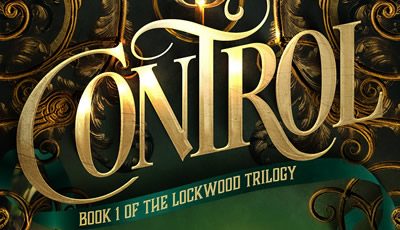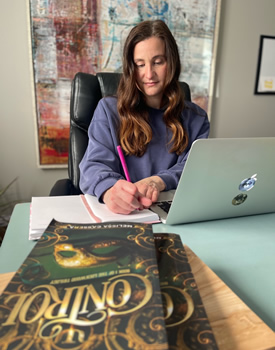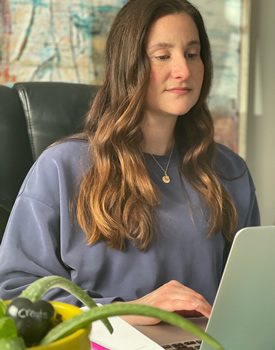

Features On the Cover: Melissa Cassera
Gaining Control
 By Dawn Ius
By Dawn Ius
You might not know debut novelist Melissa Cassera by name yet, but it’s possible you’ve seen a few of her movies. She’s written, and had produced, almost a dozen screenplays, with the bulk of her films running on the Lifetime Network.
The movies are fun, rife with the action and drama one would expect from the network. Cassera continues to grind out spec scripts—it’s clear she isn’t afraid of pitching her work, and in fact, her company is built on helping others create publicity and content strategies to elevate their messaging. She’s the behind-the-scenes wordsmith and consultant for several New York Times bestselling authors and multi-million-dollar brands.
But with her debut novel Cassera is ready to put herself—and her work—in the foreground. CONTROL is the first book in a truly binge-worthy young adult paranormal trilogy that embodies the best characteristics of Cassera’s screenwriting toolkit and adapts them into novel form to keep the pages turning at an out of control <heh> pace.
In this exclusive interview with The Big Thrill, Cassera shares more about the inspiration behind her story, her transition into writing novels, and perhaps most importantly, when you can get your hands on her books.
Congratulations on CONTROL—it’s an addictive first installment in a paranormal romance trilogy that, if the first book is any indication, promises to be full of twists and turns and characters that will stick with you long after you finish the book. Obsessed! I’d love to hear more about how this book—and perhaps more fully, the world in general—evolved for you.

When Cassera isn’t writing for the screen or her novels, she’s a content strategist with her own company.
In 2013, CONTROL started as a screenplay, the very first script I’d ever written. A TV pilot for a series that was meant to carry on for at least three seasons. It was a drama set in the 1940s in a world of political intrigue, danger, and desire. The story was about adults in a very adult world.
This script did not sell (but did land me some meetings and lots of attention, mostly Hollywood execs saying: “Omg, this is so creepy and shocking.”)
Several years later, I reimagined this story as a teen version, trapped at an elite boarding school on a private island, coping with the mess and angst and politics of high school life, grappling with strange occurrences they don’t understand. Twilight meets Gossip Girl.
As for the world, there were two things I was intrigued enough to combine:
I’ve spent a lot of time researching cults and control tactics for other writing projects, and I’m always fascinated by the ways in which leaders are able to attract participants and manipulate them to maintain control.
I grew up in the 90’s where we did not have cell phones or social media. Operating in that ecosystem is very different than what kids go through today. With less distraction, everything you go through feels bigger and more amplified in a way, yet your “world” feels very small because you don’t have the ability to easily connect with other kids outside of your school.
The young adult paranormal romance landscape is dominated by vampires and werewolves. In CONTROL, your characters are primarily precogs—individuals that have a psychic ability to see into the future. What drew you to this paranormal element?
My vision (no pun intended) for this story was to have characters who could see the future, but there’s a reason they “only” have that power. That didn’t fit into any of the more mainstream paranormal/fantasy landscapes (fae, vamps, etc.) and I felt strongly about creating my own supernatural world with its own rules and secrets.
In CONTROL, we’re introduced to main characters Natalie and Henry, and it’s not a spoiler to say that the sparks between them start flying at their very first encounter. I was struck by how fully developed they are. Which character was easiest for you to write and why?
Henry was a bit easier but only because I didn’t initially follow my gut. I find that often in media (books, movies, etc.) it’s common for the male characters to have flaws, but the female characters are judged so harshly for theirs. I deal with this in screenwriting as well.
I intended for Natalie to be messy, flawed, and complicated—a girl who doesn’t always make the right decisions, who (at least at first) feels trapped and a victim of her circumstances. This is not a girl who is instantly the strongest/quickest/smartest, always making the right decisions, not getting distracted by romance, etc. Natalie is not dealing with the trauma of losing her mother by creating distractions/avoidance, etc.
I found myself second-guessing and I kind of bleached out her personality. Luckily, I caught my error and rewrote her again how I’d initially intended.
Paranormal books demand a certain type of villain. How do you go about creating those characters?
I love my villains! And that’s the key—you can’t judge your characters. You’ve got to find something you love about them.
A good villain comes down to motive. If the motive is believable, you can put yourself in that character’s headspace and justify their actions. Even when they are a paranormal species their motive needs to have humanity.
Going back to when you first thought about writing CONTROL, did you see an empty space in young adult paranormal romance that you wanted to fill?
I can only really speak to the indie publishing space as the business structure and marketing is different than trad publishing—there’s not an emptiness but more of an opportunity. There of millions of readers hungry for twisty, fun, not-so-guilty pleasure paranormal romance—readers just like me! So I wanted to write something for them.
I also wanted to write a more complicated female character, even one that some might judge as “unlikeable.”
For me, a “strong female lead” means we get to see that female character with wounds and flaws, often taking wrong turns and making wrong decisions along the way to healing/growth, etc.
The series is called The Lockwood Trilogy, which is in reference to the elite boarding school the characters attend. This type of setting has become quite popular over the last year or so. What do you think the allure of these settings is for audiences and readers?
I think it’s a combination. Lots of readers are very drawn to the dark academia aesthetic, so this helps a lot with marketing and visualization of the world. There’s also an inherent creepiness to boarding schools—being tucked away often means you’re hiding lots of secrets.
CONTROL has a cinematic feel—I can absolutely see this on TV or in a theatre—which perhaps makes sense given your extensive screenwriting background. After achieving so much success in the film industry, what was the catalyst for writing a novel? How have your skills as a screenwriter helped—or hindered—you as a novelist?
Screenwriting is a very collaborative medium, which can be a beautiful thing, but I had a craving for more ownership over my work. I also thought it would be fun to stretch my writing muscles as an author.
Screenwriting absolutely helped for obvious reasons (story structure, dialogue, giving your book a cinematic quality). I primarily write thriller films so I knew I’d be good at chapter cliffhangers and writing twists and turns that many readers won’t guess.
As a screenwriter, I also have a lot of practice with creating and putting my writing out into the world. Not everyone is going to like your work. You will get criticized. You will get bashed. You will likely get emails from very irate readers/colleagues/other writers. You may even have a scary stalker situation. All of this has happened to me. You learn not to take any of this personally and think of it as a necessary path to finding your ideal readers.
The main challenge in shifting from screenwriting to novel writing is that we have so little real estate in scripts and you’re always cutting, cutting, cutting. In books, you have all this space! You can be descriptive!
I have no doubt CONTROL was written alongside an impressive playlist. What songs were knocking around in your head as you wrote this book?
If it wasn’t for an epic remix of Hit Me Baby One More Time by Britney Spears, I never would have had the idea! I’m very visual and always “see” the scenes before I write them. Some other faves are Ruelle, Sofia Karlberg, Hidden Citizens, and Madalen Duke.
One of the things you’re especially good at is building tension—physical, mental, emotional. Can you share any insights on how to do that well?
Thank you! I really like to dive into my character’s minds and figure out what they are warring with. This works especially well in CONTROL because my characters are angsty teenagers, so they are warring with a lot, and the stakes feel very high.
One thing I love using is communication, or lack of communication, to build tension. I’m obsessed with psychology and human behavior, and communication is a primary issue everyone deals with in one or more areas. It’s very rare for someone to say exactly what they want to say, in the perfect way they meant to communicate it. Especially when you’re young, although most of us struggle with communication even as adults! When my characters communicate, there is almost always something they are not saying, and they are feeling some kind of way about that (frustrated, sad, angry, anxious, etc.)
Another technique I use is distraction—in what ways are my characters distracting themselves from their core wound? What are they doing to avoid having to deal with their issues? And I always check in with my characters on that, making sure they aren’t wrapping things up too neatly, or suddenly have all the power/strength/emotional intelligence to overcome everything thrown their way.
Another technique that we use all the time in screenwriting is setting things up and not knocking them down too quickly. For example, when Henry has his first vision about Natalie dying, he doesn’t immediately rush over to her and say “I just had a vision of you dying.” First, it’s forbidden and punishable to disclose your vision or try and change it. Beyond that, if you were a teenage girl and some new guy at school came up to you and said “I had this vision that you are going to die,” chances are you’re going to think he’s lying, bullying you, or just completely bananas. There’s a lot of tension built as he grapples with what to do about his vision. And because Henry is a quiet, broody, introverted guy, he expels a lot of that emotional pain physically, which then creates physical tension.
Please tell us a little about the second book in your Lockwood Trilogy—what it’s about (no spoilers!), and most importantly, when can we get our hands on it? Do you have any other projects—even screenwriting—you’d like to promote / talk about?
The second book, UNRAVEL, jumps off the Book 1 cliffhanger and features a Dual POV with Natalie and (another character we meet later in the book) Wes, though Henry plays a huge role in the second book. We only got to know Wes in Book 1 through Natalie and Henry’s perspectives, so in Book 2, we get to know all the secrets he’s been holding and why. UNRAVEL comes out November 2023!
I’m also working on a novella set in the Lockwood world that’s a Hades/Persephone reimagining. I have five thriller movies in various stages of development, one going into production in May and some other exciting film and TV projects I’m not at liberty to disclose yet.
- On the Cover: Alisa Lynn Valdés - March 31, 2023
- On the Cover: Melissa Cassera - March 31, 2023
- Behind the Scenes: From Book to Netflix - March 31, 2023



